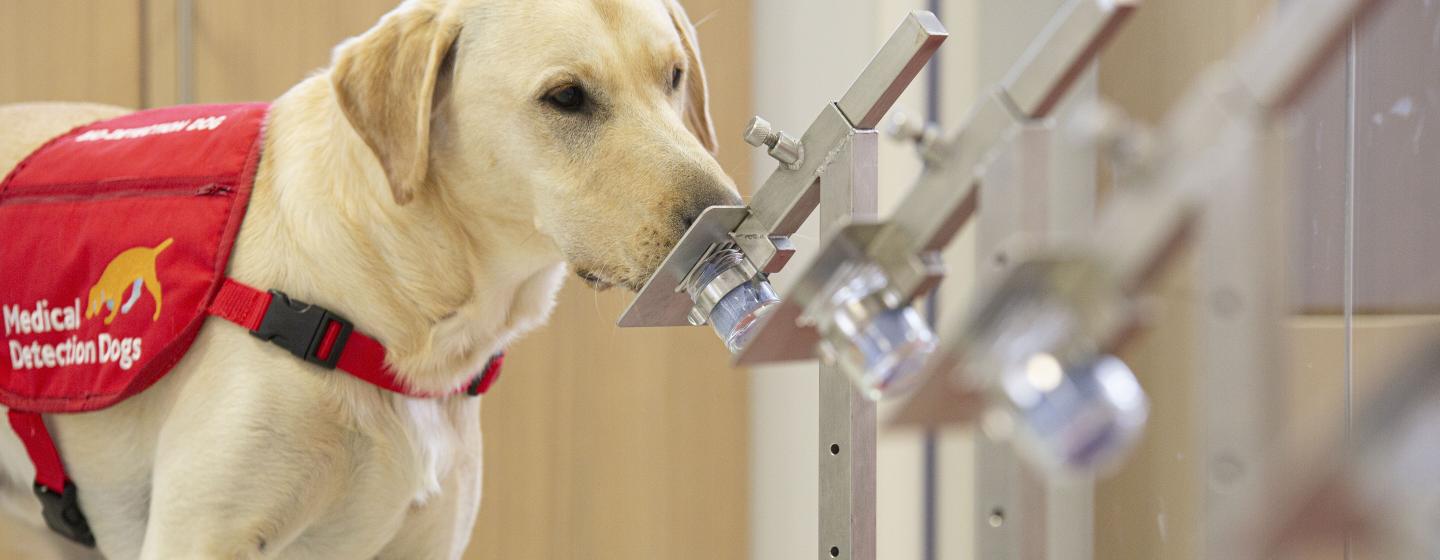
Purina and Medical Detection Dogs call for international standards in training disease sniffer dogs
-
Recommendations include strict limits on dogs’ working time and agreed guidance for training and deployment.
-
Trained dogs could be deployed at places such as airports and train stations to facilitate the reopening of global travel.
26 May 2021 - Nestlé Purina PetCare EMENA has partnered with Medical Detection Dogs (MDD) to call for the creation of international standards in the training and deployment of sniffer dogs.
Purina has also donated £100,000 (116,000 EUR) in funding towards Medical Detection Dogs’ training and potential deployment of the COVID-19 dogs in public spaces.
The UK charity has led the way in training dogs to detect human disease for more than 12 years. It is currently underway with research on scenting COVID-19, with a goal of proving that dogs can play a key role in public safety through their ability to detect the virus’ odour.
Following this, researchers will move to trial the dogs at sites such as ports of entry and public spaces, where dogs may screen individuals rather than samples and contribute to the fight against the virus by detecting COVID-19 carriers. Other pilot sniffer dog schemes are at the same time being rolled out in countries including Finland, Russia, Italy and France, but there is currently no centralised best practice process for such programmes.
Medical Detection Dogs and Purina are calling for –
- Time limits on deployment, to ensure that a COVID-19 detection dog will only be operationally deployed for approximately four hours over the course of an eight-hour working day. Each dog will also ideally be limited to 20-minute shifts to prevent fatigue and ensure reliable performance
- Common standards on housing for dogs to ensure dogs are not stressed or distracted by close interaction with people
- Agreed guidance for the training and deployment of future schemes around the world
Medical Detection Dogs founder and CEO Dr Claire Guest said: “Sniffer dogs have the potential to make an important contribution to the fight against COVID-19 and future pandemics. Researchers around the world are urgently working to meet that need, but it is vital that we collaborate, share the knowledge we have gained on the incredible abilities of our dogs and formalise best practice in training and deployment.
“Along with Purina we want to call for international collaboration between organisations around the world on the implementation of disease detection and research. Our vision is to guarantee that dogs are well-treated and consistent in their performance, and support the reliable, safe creation of similar schemes in developing countries, where dogs could play a huge role in halting the spread of this disease and future pandemics.”
Marie-Jose Enders-Slegers, president of the International Association of Human-Animal Interaction Organizations (IAHAIO) said: “We fully support this call from Purina and Medical Detection Dogs for organisations to share knowledge and align on basic principles to train and deploy detection dogs. This represents a vital step in standardizing the rollout of schemes around the world to help detect and combat COVID-19 in early stages, and with the prospect of making daily life more “normal”.
Jeff Hamilton, CEO at Nestlé Purina PetCare in Europe, Middle East and North Africa said: “Purina and Medical Detection Dogs share a belief in the positive role and impact of dogs in society. These dogs could provide fast, effective and non-invasive diagnosis and help to create safer spaces for us all, but we should ensure that each of them is trained safely, humanely and able to effectively perform their important role in detecting COVID-19.
“That is why we along with Medical Detection Dogs are calling for international knowledge sharing, supporting the creation of best practice principles. We believe this can represent a vital first step in helping researchers to agree how sniffer dogs can be best deployed internationally, and will potentially aid in the cost-effective, reliable rollout of schemes in countries around the world.”
NOTES TO EDITORS
Like humans, dogs become fatigued and demotivated if over worked. A COVID-19 detection dog should be operationally deployed for a maximum of 4 hours over the course of an 8-hour working day, each dog will be limited to 20-minute shifts to prevent fatigue and ensure reliable performance.
As dogs are normally worked in alternate pairs this could be spread over an 8-hour day and could be over several hours if they have long rests in between each search.
Dogs that are trained as Medical Detection Dogs are selected to be sociable and are not used for guarding or protection. This means that they like being around people and should avoid environments which generate stress responses, which negatively affect performance and the health of the working dog.
Any standards should also conform to the standards of all research carried out by Medical Detection Dogs:
- Evidence-based research with independent collaborators including NHS trusts and academic institutions
- Robust double-blind testing protocols for each research study
- Submitting research to peer-reviewed publications that provide validation and dissemination of the performance of canine olfactory capabilities
In undertaking COVID-19 research, Medical Detection Dogs is partnering with the London School of Hygiene and Tropical Medicine and Durham University. These universities previously partnered with Medical Detection Dogs to undertake research which successfully proved that dogs can detect Malaria.
ABOUT Medical Detection Dogs
Medical Detection Dogs is the world-leading organisation for research into canine olfactory diagnostics. We train dogs to detect the odour of disease with the aim of developing faster, more efficient and less invasive diagnostics that lead to better patient outcomes. Our Bio Detection research includes cancer, neurological disease and bacterial infections and has the potential to benefit millions. We already apply what we know about the science of canine olfaction to benefit people by training Medical Alert Assistance Dogs, which help individuals manage complex, life-threatening medical conditions. www.medicaldetectiondogs.org.uk